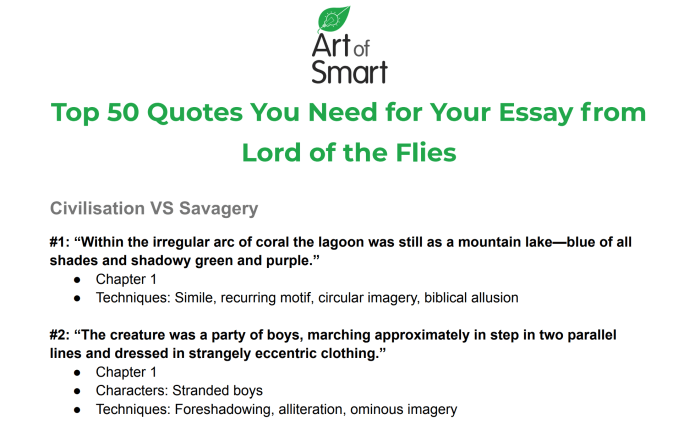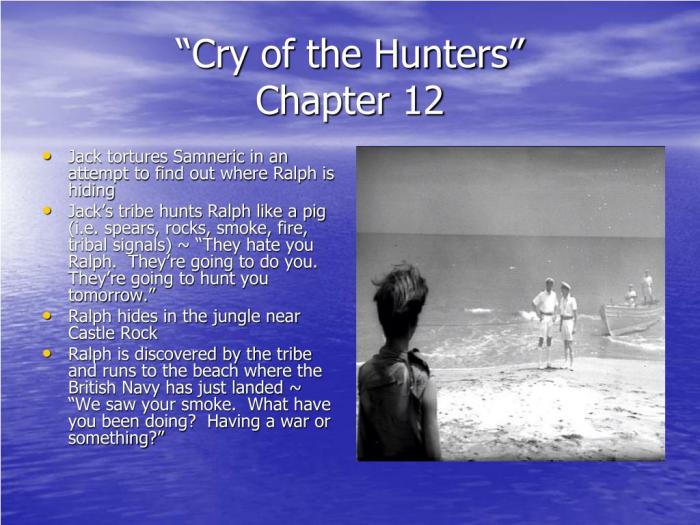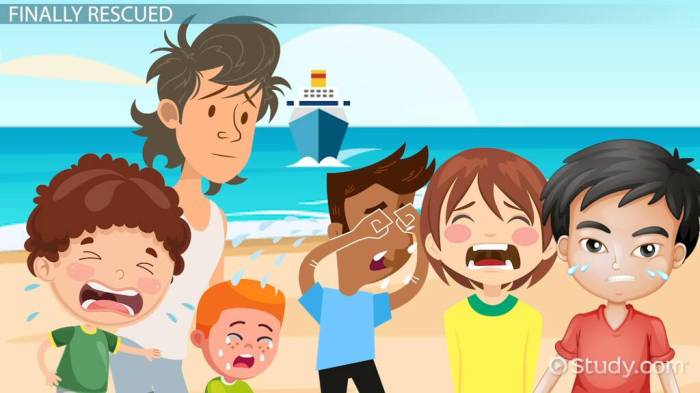Quotes chapter 12 lord of the flies – In the captivating chapter 12 of William Golding’s Lord of the Flies, the power of words and their profound impact on the characters’ journey towards savagery are vividly portrayed. Through an exploration of key quotations, this chapter delves into the novel’s central themes, character development, and the profound symbolism embedded within.
As the story unfolds, the characters’ words become mirrors reflecting their inner struggles and the disintegration of their civilized facade. From Piggy’s poignant observations to Ralph’s desperate pleas for order, each quotation carries a weight that shapes the narrative’s trajectory.
Character Quotations
The novel “Lord of the Flies” by William Golding features a cast of characters whose words play a crucial role in shaping the narrative and revealing their inner conflicts. The quotes uttered by Piggy, Ralph, and Jack hold particular significance in driving the plot and exploring the themes of civilization versus savagery.
Piggy’s Quotes
Piggy, the intelligent and rational member of the group, often serves as a voice of reason amidst the chaos. His quotes highlight the importance of logic, order, and the preservation of rules:
- “Rules!”– Piggy’s desperate plea for adherence to established rules symbolizes his belief in the necessity of structure and organization to maintain a semblance of civilization.
- “I got the conch! I got the conch!”– Piggy’s repeated assertion of his possession of the conch represents his attempt to assert authority and control over the group.
- “We’ve got to have rules and obey them. After all, we’re not savages.”– Piggy’s statement emphasizes the contrast between the boys’ civilized upbringing and their descent into savagery.
Ralph’s Quotes, Quotes chapter 12 lord of the flies
Ralph, the elected leader of the group, embodies the ideals of democracy and cooperation. His quotes reflect his struggle to maintain order and his growing disillusionment with the boys’ behavior:
- “We’ve got to make rules and keep order. That’s what grown-ups would do.”– Ralph’s initial attempts to establish a fair and just society highlight his commitment to reason and maturity.
- “I don’t care what they call me, so long as they don’t call me chief.”– Ralph’s reluctance to accept the title of “chief” demonstrates his humility and desire to lead through consensus.
- “We’re going to have fun on this island. We’re going to have a good time!”– Ralph’s early optimism and enthusiasm contrast with the eventual descent into chaos, foreshadowing the boys’ inevitable failure.
Jack’s Quotes
Jack, the charismatic and power-hungry antagonist, represents the primal instincts of savagery and violence. His quotes reveal his disdain for rules and his desire for dominance:
- “Bollocks to the rules! We’re strong—we hunt! If there’s a beast, we’ll hunt it down! We’ll kill it!”– Jack’s rejection of civilization and embrace of violence foreshadows the group’s descent into chaos.
- “I’m chief. I’ll tell you what to do. And you’ll do it!”– Jack’s assertion of authority highlights his tyrannical nature and desire for absolute control.
- “We don’t need rules. We’re strong. We’re free.”– Jack’s words encapsulate the seductive appeal of savagery, promising freedom from societal constraints but ultimately leading to destruction.
Quotations and Symbolism

The novel “Lord of the Flies” by William Golding employs powerful symbolism to convey complex themes and character development. The conch, the island, and the fire serve as central symbols, and their significance is reflected in the characters’ quotes.
The Conch
The conch represents order, civilization, and the rule of law. When the conch is blown, the boys are expected to gather and listen to the speaker. Its presence signifies a sense of community and democratic process.
“We’ve got to have rules and obey them. After all, we’re not savages.”
“Conch! Conch! Blow the conch!”
The Island
The island symbolizes both the potential for civilization and the dangers of savagery. Initially, the island represents a paradise, but as the boys descend into chaos, it becomes a place of fear and violence.
“This is our island. It’s a good island. We can live here together.”
“We can’t have rules here. We’re free now.”
The Fire
The fire symbolizes both hope and destruction. It provides warmth, protection, and a sense of community, but it can also be destructive and out of control.
“We’ve got to keep the fire going. It’s our only hope.”
“We’ll hunt the beast and make a fire that will reach the sky.”
Quotations and Themes: Quotes Chapter 12 Lord Of The Flies

The novel “Lord of the Flies” by William Golding is a profound exploration of human nature, particularly the conflict between civilization and savagery. The characters’ words and actions throughout the story serve to illuminate the novel’s central themes, offering insights into the human psyche and the fragility of society.
One of the primary themes that emerges through the characters’ quotations is the struggle between civilization and savagery. As the boys are stranded on the island, they initially attempt to maintain order and follow the rules of their former society.
However, as time passes and the pressures of survival mount, their civilized veneer begins to crumble, and their primal instincts take over. This theme is exemplified in the following quote by Piggy:
“I’m frightened. Of us. I want to go home. Oh, God, I want to go home.”- Piggy
Piggy’s fear reflects the growing sense of unease among the boys as they realize the extent to which their civilized society has disintegrated. The island has become a microcosm of the broader human condition, where the forces of civilization and savagery are constantly at war.
Power and Control
Another significant theme explored through the characters’ quotations is power and control. The island provides an opportunity for the boys to establish their own hierarchy, and the struggle for dominance becomes a driving force in the novel. Ralph, Piggy, and Jack emerge as the main contenders for power, and their interactions reveal the corrosive effects of unchecked ambition.
Ralph, as the elected leader, initially represents the forces of order and reason. However, he is gradually undermined by Jack’s growing influence over the boys. Jack’s desire for power and control is evident in the following quote:
“I’m going to have them. I’m going to get them. They’ll be sorry they ever laughed at me.”- Jack
Jack’s words foreshadow his descent into savagery and his ultimate usurpation of Ralph’s authority.
Fear and its Impact
Fear is a pervasive force in “Lord of the Flies,” driving the characters’ actions and decisions. The boys are constantly haunted by the unknown dangers of the island, from the mysterious “beast” to the potential for violence among themselves. This fear leads to paranoia, suspicion, and a breakdown in communication.
The following quote from Simon captures the paralyzing effects of fear on the boys:
“The beast was on its knees in the center, its arms folded over its face. It was crying out against the abominable noise something about a body on the hill.”- Simon
Simon’s words reveal the psychological toll that fear has taken on the boys, driving them to the brink of madness.
Quotations and Character Development
Throughout William Golding’s Lord of the Flies, characters’ quotes serve as windows into their evolving identities and the transformative experiences they undergo. The novel’s central figures, Piggy, Ralph, and Jack, experience significant character arcs that are reflected in their evolving language and perspectives.
Piggy
Piggy’s initial quotes reveal his intelligence, rationality, and adherence to rules. As the novel progresses, his quotes demonstrate his growing disillusionment and frustration. His famous quote, “Life… is scientific, that’s what it is,” reflects his belief in order and reason.
However, as he faces the brutality and irrationality of the island’s society, his quotes become more cynical and despairing.
Ralph
Ralph’s quotes initially reflect his idealism and optimism. He believes in democracy and the importance of civilization. However, as he witnesses the savagery and violence that grips the island, his quotes become more disillusioned and weary. His quote, “We were all like that once—innocent, before the world had wrung our necks,” captures his sense of loss and the realization that the innocence of childhood is gone.
Jack
Jack’s quotes provide insight into his descent into savagery. Initially, his quotes reflect his pride and ambition. He desires to be the leader of the group and establish his own rules. However, as he gives in to his primal instincts, his quotes become increasingly violent and brutal.
His quote, “We’ll hunt, and we’ll kill,” foreshadows his transformation into a savage and the ultimate destruction of the island’s fragile society.
Quotations and Literary Devices

The characters’ words in Lord of the Fliesare rich in literary devices that enhance the novel’s themes, character development, and overall impact. These devices include foreshadowing, irony, imagery, and sensory details, each contributing to the novel’s depth and complexity.
Foreshadowing
Foreshadowing is used extensively in the characters’ quotes to hint at future events or developments in the plot. For example, when Ralph says, “We’ve got to have rules and obey them,” it foreshadows the conflict between Ralph’s attempts to establish order and the growing savagery of the boys.
Irony
Irony is also prevalent in the characters’ words. For instance, when Jack says, “We’ll hunt. We’ll have fun,” it is ironic because hunting ultimately leads to violence and chaos, the opposite of fun.
Imagery and Sensory Details
Imagery and sensory details are used to create a vivid and immersive setting. For example, when Simon describes the island as a “heart of darkness,” it evokes a sense of mystery and danger that permeates the novel.
Frequently Asked Questions
What is the significance of the conch in chapter 12?
The conch represents the remnants of civilization and order. Its destruction symbolizes the triumph of savagery and the characters’ descent into chaos.
How do Piggy’s quotes reflect his character?
Piggy’s quotes reveal his intelligence, his understanding of the group’s dynamics, and his desperate desire for order. His words often serve as a voice of reason in the face of mounting chaos.
What is the role of foreshadowing in the characters’ quotes?
The characters’ quotes often foreshadow events to come. For example, Jack’s violent threats foreshadow his descent into savagery, while Piggy’s warnings about the dangers of the island foreshadow the tragic events that unfold.